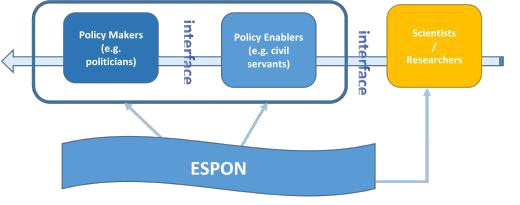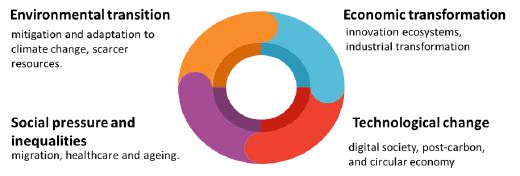Shaping the future of the ESPON programme
As the next programming period approaches, the exchanges between the participating Member and Partner States, organised in the so-called Joint Working Group to shape the next ESPON programme, are intensifying. From the beginning, more than a year ago, the process has been driven by a strong commitment from all involved to reflect on the lessons learned from current and past experiences to further develop the programme in a changing environment and make it more effective and efficient.
One of the main challenges is to bring the programme even closer to the needs of policy-makers and other stakeholders. This will be achieved by reinforcing the dialogue and exchange between policy-makers and researchers and academia, which will also help to ensure the usefulness of the evidence produced by ESPON. One of the lessons learned during this programming period was that, to achieve ESPON’s mission to support evidence-based policy-making or better informed policy-making, the mere provision of territorial evidence is not enough. Furthermore, to ensure the use of and constructive work with ESPON’s evidence in the various stages of the policy cycle, the evidence has to meet the needs of policy-makers: it has to be understandable, accessible and specifically tailored to their requirements. To make this happen, the active involvement of researchers in the implementation of ESPON activities and in dialogue with policy-makers, policy enablers and researchers is crucial.

Such dialogue should help researchers to better frame specific policy-relevant questions and understand the context triggering the demand for ESPON knowledge. To find the right policy responses, the questions asked need to be well understood by all actors. For this reason, the future ESPON programme needs to pay sufficient attention to the creation of interfaces between the its main stakeholders.
The underlying rationale of the next ESPON programme will be knowledge-to-action logic. This means that a policy-maker uses knowledge to take action. Knowledge, however, means much more than having important evidence to hand. Therefore, the research and evidence produced by ESPON needs to be put into the policy context relevant to policymakers, so that they can learn how to use the ESPON evidence in their reality.
A contribution from the ESPON Managing Authority
So far, this aspect has not been well enough developed in ESPON. From now on, first, there needs to be a stronger focus on knowledge development, which means in practice ensuring that policy-makers and other users of evidence can learn how use the evidence in the relevant policy context. Second, the evidence produced by ESPON needs to be better linked to the knowledge demands of stakeholders to be useful, and this can be achieved only by directly linking evidence production with outreach activities, like the parts of a gearbox.
Evidence on what?
What makes ESPON different from other research programmes is the systematic focus on territorial dimensions and perspectives as the prism or lens through which it organises and approaches all its research activities. ESPON has been unique in developing a functional approach to territorial development over many years, and it analyses policy challenges and their implications both from a territorial perspective and taking a pan-European comparative approach. Accordingly, the consequent focus on territories, places, cities, rural areas, etc., will continue to be one of ESPON’s fundamental characteristics.
ESPON is part of, but also should contribute to, cohesion policy, while supporting the Territorial Agenda and its implementation. The themes related to territorial cohesion – as defined in cohesion policy and in the (currently still draft) Territorial Agenda 2030 – offer a broad framework for ESPON’s future activities, but a sharper focus is needed. Therefore, ESPON’s interventions should concentrate on Europe’s main territorial challenges to which policy-makers have to find the right answers. Adapting to these challenges or creating new paths for territories in terms of a transition towards a green and just development are the two main options for responding strategically. How much ESPON can potentially contribute to such strategies will be the basis for identifying the most important subjects and activities for the next ESPON programme.

The Member and Partner States currently preparing the next ESPON programme are discussing concentrating on two overarching strands, namely GREEN and JUST, under the umbrella of a territorial perspective. ESPON’s mission may focus on support for transition through the promotion of territorial evidence for a climate-neutral, just and territorially balanced Europe. These two overarching strands have to be combined and integrated; the work should deliver smart solutions, always with a focus on the territorial dimension.
To ensure that the programme is effective and able to link evidence production and knowledge creation, as described above, the joint working group is also discussing strategically organising and programming ESPON’s activities in individual thematic action plans (TAPs), thus giving a thematic approach a central role in defining ESPON’s activities.
TAPs are strategic documents identifying the evidence needs in relation to a specific territorial challenge and/or opportunity at different administrative levels. A TAP should identify the existing evidence, the complementary evidence that needs to be produced to address those needs and the specific knowledge activities that are required to bring the tailored evidence to the target groups and enable them to use it in the relevant policy context.
This thematic approach through the TAPs will make it possible to start dialogue and consultation early, at the stage of the needs assessment, by bringing together stakeholders and scientists to identify the specific needs to be addressed. This might involve flagging existing and available evidence, defining the added value that additional ESPON research activities could bring or considering what questions could realistically be answered. This approach would also ensure the necessary synergies and interrelation among ESPON’s activities on a particular theme.
Next steps
The Joint Working Group is actively seeking to further focus the thematic interventions of the ESPON programme to better match the evidence needs of all stakeholders and target groups and to develop further the details of the implementation model. The next steps envisaged by the joint working group include launching, in the coming weeks, a public consultation concerning more specific themes for which evidence is needed, open to all stakeholders and scientists. The results will help the Joint Working Group to further focus the thematic scope of the next ESPON programme. More information will be shared at the next ESPON seminar, to take place in Berlin in the third week of November 2020, an occasion when we can, we hope, meet again physically to discuss the future of the ESPON programme.